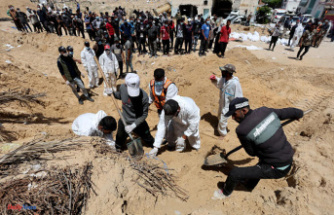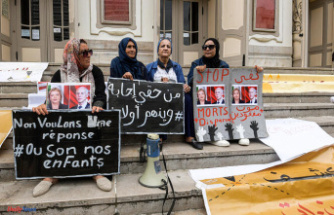One year ago, South Africa's President Cyril Ramaphosa described a violent "insurrection", which led to more than 300 deaths. The country still struggles with deep political and economic problems and fears for more unrest.
As the N2 motorway meanders through pale green sugarcane fields, it is dominated by the black skeleton from a burned-out chemical plant.
You can still see at many intersections the marks and scars left by the burning barricades which spread with chilling speed across this coast region exactly one year ago. This was accompanied by an almost week-long frenzy filled with arson, looting and murder.
Many shops, malls, and businesses were destroyed. Many people lost their jobs.
According to an estimate by the president's bureau, South Africa's economy was costing $3.4bn (PS2.8bn). This was the worst act of violence that had ever been committed in South Africa since 1994, when democracy was established.
According to reports, the chaos was caused by Jacob Zuma's political allies in reaction to his contempt of court imprisonment.
Zuma continues to enjoy the support of a left-wing faction within the governing African National Congress, (ANC), which is also linked to the corruption that thrived during his presidency.
Zuma's children used social media to urge rioters to let everything burn and to advise them to loot responsibly.
The violence and arson were initially carefully planned and coordinated.
It felt for a few days that this young democracy was on the verge of collapse, and it was incredibly gut-wrenching.
There have been signs that KwaZulu-Natal has rebounded in the months since, despite the devastating floods and Covid.
Many businesses have reopened. Numerous shopping centers have been rebuilt. At least some tourists are returning from the Indian Ocean beaches.
Brett Moran, a private security firm that protected the Ballito seaside community during unrest, says "We South Africans can be resilient."
"But maybe, we're just too resilient. We forget... too quickly," he adds.
It might seem strange to think of a country as "too resilient".
It reflects South Africa’s remarkable capacity to absorb and tolerate crises, including record-breaking levels of corruption and high unemployment. However, it does not seem to be a call for change.
Many people in Durban and elsewhere fear that last year’s unrest is not a one-off and that the country could be sleepingwalking into deeper trouble.
"This unrest is being organized by a disgruntled group from within the ANC. They want Zuma to remain president," Thulani Mthetwa says. Thulani Mthetwa is a community organizer in a poor informal settlement located across the motorway from Ballito.
President Cyril Ramaphosa was the one who chillingly described last July's violence in an attempt to provoke a popular uprising and as "a coordinated, well-planned and deliberate attack on our democracy" by members of his party.
President Nelson Mandela saw an uprising but it failed. This was largely because local communities rallied to defend themselves and thousands of soldiers were deployed. He had a rare opportunity to take control of the situation and strike back against the forces that have made South Africa a mess.
How much progress have we made in a year?
It is encouraging to note that the Zuma corruption scandal has been exposed by a public inquiry for years. Prosecutors were provided with mountains of evidence to support future cases.
The Zondo Commission inquiry may be viewed as a watershed moment. It will weaken the Zuma faction in the ANC and re-energize the fight against corruption.
There are good reasons to be skeptical.
It is notable that not one prominent politician was charged with the violence last year. This is most likely due to years of political meddling, mismanagement, and weakening of the criminal justice system.
Many of the Zondo Commission's implicated figures still hold high-ranking positions in the ANC, as they attempt to use internal disciplinary procedures against their advantage.
"Nobody will be charged." South Africa has become desensitized," says Phumzile Van Damme, an ex-opposition MP and disinformation expert who is considering a return to politics.
"The state is in danger of collapsing." "I believe we are moving quickly towards collapse."
There's also President Ramaphosa.
South Africa sighed collectively of relief after Zuma, a soft-spoken union leader who turned into a businessman, resigned in 2018.
Ramaphosa was widely regarded as a principled, clean figure who could steer the ANC and the country away from the cliff's edge.
However, this early optimism is now fading.
Some people blame the president, accusing him of being too consensus-builder and too slow to confront heads and assert his authority.
Others point out a new political scandal orchestrated by his enemies. However, it involves potentially serious questions about an allegation of theft and cover-up at his private farm. This could threaten his hold on power. The president denied any wrongdoing.
However, many here believe that the inevitable conclusion is more complex: that it is impossible to reform a party of liberation that has been at the top for almost three decades.
"Cyril Ramaphosa is not the solution. Songezo Zibi, a political activist and prominent intellectual, says that while the ANC knows what reforms are needed, they don't have the will to implement them.
Many South Africans now have a new perspective on the ANC's failures.
Deep winter is here in South Africa. Nightly temperatures drop below zero on the high plains of Johannesburg. The entire country is currently under the constant grip of power cuts that last for days, also known as "loadshedding" in South Africa.
These are the results of decades of poor planning, mismanagement, and industrial action in the energy sector. They also include disturbing incidents of sabotage (some allegedly connected to the ANC's internal disputes) and staggering levels of corruption, according to the Zondo Commission.
Combining last year's riots with the blackouts, this has led to an acceleration in capital flight from South Africa.
What can be done to stop this rot?
Some believe the answer lies with the 2024 national elections, in which the ANC could lose its majority for the very first time.
This would allow the country to enter a new period of potentially revitalizing coalition politics that is ripe for small political parties.
"There is a huge chasm at the centre of South African politics. This is especially true for middle-class urban voters who want a united country with strong anti-corruption policies," stated Ms Van Damme. She was formerly a member the opposition Democratic Alliance.
However, the ANC's struggles – whatever their duration - don't guarantee a smooth transition to South Africa's electoral system.
No single opposition party seems ready to take its place. There is also concern that the largest winners may be the most radical and disruptive parties on the left or, more often, on the right. This could push South Africa further into xenophobia, and further lawlessness.
Over all these outcomes, one thing is most concerning to some South Africans: the possibility that the ANC refuses power at the ballot box.
"We are still in denial. We have been living in unfounded optimism for far too long. "I believe that the ANC will attempt [next] election in different ways," said Mr Zibi, warning South Africa was in danger of falling prey to the perilous economic and political collapse of neighbouring Zimbabwe.
None of this is impossible.
The ANC is in a very poor state. Although it may attempt to rig elections, the institutions that are [electoral] still stand strong. Mavuso Msmimang is a veteran of anti-apartheid struggles and a powerful moral voice within the ANC. "I think the country can turn around but not by ANC in its current status," he said.
If President Ramaphosa is able to retain power, the slow process to rebuild damaged institutions such as the prosecutor's offices may lead to a surge in corruption convictions.
South Africa could be reenergized by new, bold movements that are supported by a civil society and the private sector.
South Africa's famed resilience, which was honed during years of racial apartheid, could help it return to the promising path it started almost three decades ago.
Continue reading:












